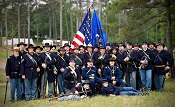Pictures - Company B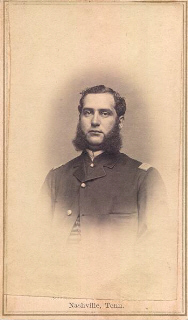 Capt. James C. Shaw Company B, 123rd New York James C. Shaw enlisted on August 9, 1862 in Greenwich to serve for three years. He was 23 years old. He mustered in as a second lieutenant on August 14, 1862 and was promoted to 1st lieutenant on September 4, 1862 in Company A. On June 10, 1863 he was promoted to captain of Company B. He mustered out with the company on June 8, 1865 near Washington, D.C. He was commissioned second lieutenant on September 10, 1862, with rank from August 9, 1862; not commissioned first lieutenant; commissioned captain on July 31, 1863 with rank from June 10, 1863. Capt. Shaw was a member of George I. Robinson's Officer's Mess Tent Group which included Capt. Gray, Lt. Hill, Lt. Cruickshank, Lt. Bosworth, Lt. Robinson and Capt. Mason and is mentioned in both the Robinson and Cruickshank diaries. After the war, James C. Shaw was elected Sheriff of Washington County in 1868. 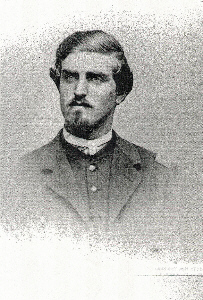 1st Lt. William W. Brown Company B, 123rd New York William W. Brown enlisted on August 9, 1862, at Granville, to serve three years. He was 21 years old. He mustered in as a private in Co. K on August 22, 1862. He was promoted to first sergeant on September 4, 1862. He mustered in as first lieutenant, Co. B on January 30, 1863. He was wounded in action on June 18, 1864 at Kennesaw Mountain, Georgia. He mustered out with the company on June 8, 1865, near Washington, DC. Also borne as William H. Prior service as a sergeant in Co. I of the 42nd Illinois Volunteers. Commissioned first lieutenant on May 21, 1863, with rank from January 29, 1863. 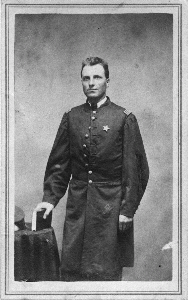 1st Lt. George Washington Smith Company B, 123rd New York George Washington Smith was born in 1842 and lived and farmed in Wyoming County, N.Y., until he enlisted at age 20 in his uncle George Warren's Company B, 123rd New York at Kingsbury. He mustered in as a private, Co. B., August 13, 1862, was promoted to first sergeant, September 4, 1862, and then was promoted to 2nd lieutenant, June 10, 1863. Smith was wounded at the Battle of Gettysburg and again at the Battle of Dallas, Georgia. He was promoted to 1st lieutenant in Company K on March 27, 1865. He mustered out with the company on June 8, 1865, near Washington, D.C. After the war, George W. Smith moved to Jefferson, Marion County, Texas, with his uncle George Warren and opened a mercantile business. After the business failed, Smith was elected as the Marion County delegate to the State Constitutional Convention of 1868-69. He was an advocator of freedmen's rights, which infuriated the white population of Northeast Texas. At the close of the convention, he returned to Jefferson and was ostracized in the community and his life was threatened on numerous occasions. Smith, known for his fearlessness, stayed on in Jefferson. On October 4, 1868, he was forced to defend himself after being fired upon by four townsmen led by Col. Richard Crump. Smith returned fire and wounded two of the assailants. Smith was subsequently arrested and jailed to wait trial on assault charges. On October 5, 1868, despite the added security of 16 soldiers to protect Smith, a lynch mob of 70-80 townsmen and members of the Knights of the Rising Sun overwhelmed the guards, murdered two blacks being confined in the jail and shot George W. Smith to death in his cell. Thirty-six townsmen were arrested and twenty-four eventually stood trial for murder. A military commision found three men guilty of murder and four more guilty of threatening the life of a local judge. The rest were released from custody. In the end, George Washington Smith was condemned by Southern Democratic newspapers as a nefarious carpetbagger who sought to elevate former slaves over their former masters. He was praised by Radical Republican newspapers as a brave, true-hearted man whose only offenses were that he loved the cause of liberty and was the friend of the poor black freedmen. Special thanks to Ed Robinson and Bob Farrell for submitting the material. 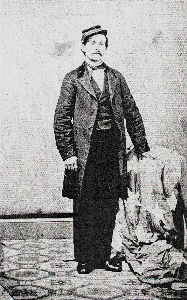 Pvt. Horace Harris Company B, 123rd New York Horace Harris enlisted on August 9, 1862, at Kingsburg, to serve three years. He was 43 years old. He mustered in as a private on September 4, 1862. He was discharged for disability on March 28, 1863 at Judiciary Square Hospital in Washington, DC. 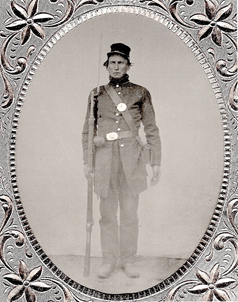 Pvt. James Lord Company B, 123rd New York James Lord enlisted on August 9, 1862, at Kingsbury, to serve three years. He was 38 years old. He mustered in as a private on September 4, 1862. He mustered out with the company on June 8, 1865 near Washington, DC. James Lord was the son of Jonathan Lord and was born in Luzeme on 30 September 1825 (his tombstone says 1824) and died of paralysis at his home in Sandy Hill at 4:00 a.m. on 10 February 1889. He is buried in the Union Cemetery, Fort Edward (Washington County), New York. His tombstone gives his unit as Co. B, 125th Regt. According to his obit, James was "much respected by his fellow townsmen." He married Rhoda Randall, born in Luzeme in December 1827 to Isaac and Rhoda (Viele) Randall. She died at home on Maple Street, Sandy Hill, the morning of 21 October 1907. James Lord of Luzeme was deeded nine acres in 1852 by William Potter of Luzeme, then an adjacent parcel of 27 acres in 1858 by Orson and Sophrona Randall. James and Rhoda of Glen Falls conveyed land on Notre Dame Street there to Lewis Hunt. James moved from Luzeme c. 1850 and he was listed as land-owning sawyer at Queensbury in 1855 with his wife and children Ester M., William H., Alice A. and Edwin D.; all but the last had resided in town two years. They moved to Sandy Hill c. 1862. James and Rhoda of Sandy Hill deeded to Sophronia Randall of Corinth their land in Luzeme in 1862. James Lord had two brothers that served in the 22nd NYSV Co. F. Asat Lord was 41 years old when he enlisted on May 8, 1861 at Glen Falls to serve two years. He mustered in as a private on June 6, 1861; mustered out with the company on June 19, 1863 at Albany, NY; subsequent service in Co. E, Second Veteran Cavalry. Sylvester Lord was 43 years old when he enlisted on May 8, 1861 at Glen Falls to serve two years. He mustered in as a private on June 6, 1861; mustered out with the company on June 19,1863 at Albany, NY. 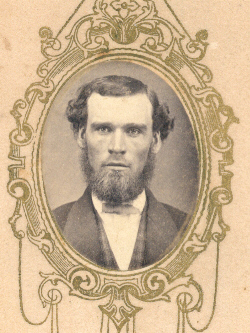 Pvt. Germond C. Mosher Company B, 123rd New York Germond C. Mosher of Kingsbury, New York, was 19 years old when he enlisted in Co. B on August 4, 1862, to serve three years. He mustered in as a private on September 4, 1862, and mustered out with the company on June 8, 1865, near Washington, D.C. Submitted by Bob Farrell. |
